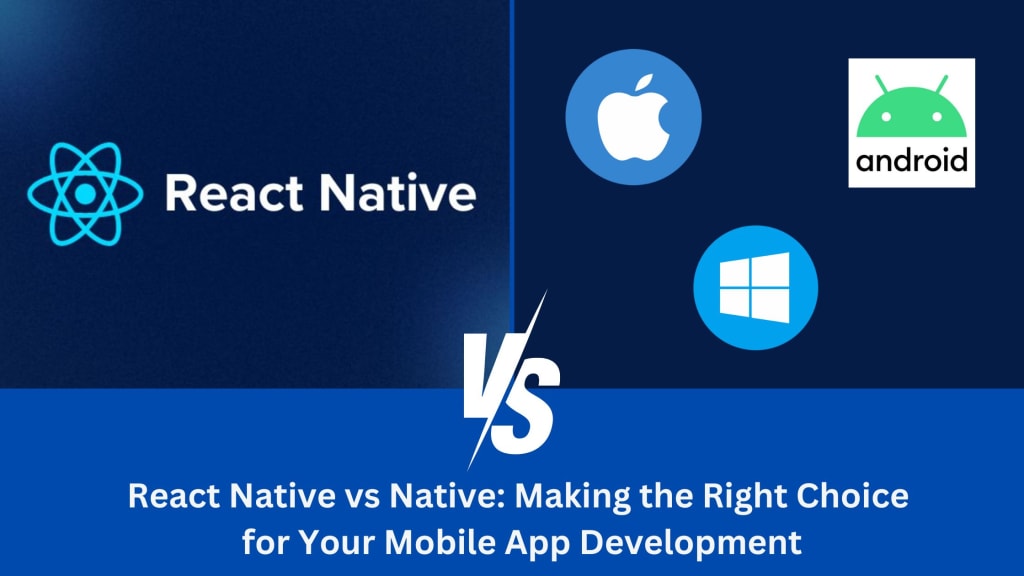React Native vs Native: Making the Right Choice for Your Mobile App Development
Choosing Between Cross-Platform and Native Development Approaches

The ongoing debate between cross-platform application development and native app development has been a subject of intense discussion. Presently, numerous business owners are choosing cross-platform apps, leading to a notable shift in the application development landscape towards more robust development methodologies.
On the other hand, some have opted to stick with native application development.
In this blog post, we will assess two technological stacks, React Native versus Native development, across various parameters to provide insights and aid in determining the optimal choice for your next development project in mobile app development services.
When deciding between React Native and Native development, it's crucial to take into account the following aspects to ensure an informed decision: performance, development time, cost of mobile app development, security, scalability, programming language, UI/UX, support for native modules, long-term support, interaction with native apps, APIs, third-party libraries, and application maintenance.
1. Security
React Native employs JavaScript, similar to other frameworks based on JS, which exposes it to security risks. Opting for React Native in mobile app development can lead to challenges in safeguarding sensitive data, implementing deep linking, authentication mechanisms, SSL encryption, SSL pinning, and other aspects. Consequently, React Native applications may be susceptible to vulnerabilities such as compromising core logic, hacking of source code, and the potential for data breaches or unauthorized access.
In Native development, security takes precedence. It enables the utilization of platform-specific security functionalities, providing enhanced protection against potential vulnerabilities and offering greater control over the security measures of your application. Additionally, native apps typically receive quicker approval on app stores as they adhere more efficiently to platform guidelines, facilitating a smoother approval process.
2. Scalability
React Native enables the creation of applications capable of efficiently managing substantial data volumes and integrating new features and updates seamlessly. Its code reuse capabilities and modular architecture simplify the scaling of React Native applications according to expanding demands. This empowers development teams to handle growing data loads and evolving requirements with ease effectively.
Developing native applications entails maintaining separate codebases for each Android or iOS platform, resulting in increased time and complexity. Although native apps offer scalability, ensuring consistency across platforms and managing updates separately for each platform demands additional effort and resources. Consequently, scalability for native applications becomes intricate due to the need for more time and resources.
3. UI/UX
React Native provides a high degree of code reusability, reaching up to 90%, and permits the segregation of platform-specific code. However, crafting intricate user interfaces involving elements like navigation patterns, smooth transitions, animations, and more poses challenges in React Native app development. Moreover, replicating the development standards of both Android and iOS platforms proves to be a formidable task.
In this aspect, Native development surpasses React Native by delivering superior UI and UX. Each screen is individually designed, resulting in more polished animations, transitions, custom views, and other enhancements, thus giving Native development a distinct advantage over React Native.
4. Native Modules Support
While React Native excels in managing cross-platform use cases, it may not encompass all features accessible on iOS or Android platforms due to its single codebase. To access such features, your development team may need to create "native modules," requiring proficiency in platform-specific languages such as Java/Kotlin for Android or Objective-C/Swift for iOS.
In this regard, Native development holds the advantage once more, as you're constructing an application tailored for a particular platform, be it iOS or Android. Consequently, there are no limitations; you can directly access the features of that platform without requiring additional steps.
5. Native App Interactivity
React Native generally depends on third-party libraries to establish communication with other native applications, resulting in a reduced level of direct access to data and functionalities compared to native applications.
Native development facilitates effortless interaction with other native applications on the device and enables direct access to their data. This capability ensures a seamless and integrated user experience, as applications can efficiently share information and functionalities without hindrance.
6. API and Third-Party Libraries
React Native provides restricted access to APIs, limiting its ability to utilize the full range of APIs during development directly. Complex APIs beyond React Native's native support necessitate the creation of a connection layer using native technologies. This layer serves as a bridge between the React Native application and the targeted API, facilitating the integration of diverse functionalities that React Native does not inherently support.
In contrast, with Native development frameworks, your development team enjoys direct access to the APIs provided by the platform they are working on. This allows them to seamlessly utilize the APIs within the application without the need for additional layers or dependencies.
7. Performance
When comparing React Native versus Native performance, React Native operates with JavaScript, utilizing a single dedicated device thread. This enables React Native to execute multiple asynchronous tasks concurrently. However, this thread lacks support for numerous popular modules and functionalities, rendering it incompatible with fully embracing native devices, features, and cutting-edge technologies, especially when it comes to executing complex manipulations and tasks.
On the other hand, Native development utilizing native languages like Java and Kotlin empowers you to leverage advanced features, perform complex calculations, and seamlessly integrate high-end hardware devices. This capability enables your mobile app developers to efficiently create any application using native technologies.
When to Decide Between: React Native versus Native Development
When it comes to developing an application, both React Native and Native development offer distinct advantages and drawbacks for your business. Depending on the specific use case of each technology, you can select the most suitable option to maximize the potential of your business application.
Opt for React Native App Development When:
- You seek budget-friendly solutions and aim to expedite the launch of your app.
- You desire a straightforward app with minimal and uncomplicated functionalities.
- You aim to target both Android and iOS platforms while utilizing a single codebase or working within a budget.
- You anticipate developing a social media application or intend to incorporate Facebook ads into your app.
- Your application doesn't require extensive interactions with other native applications.
- You are in the process of creating an eCommerce app.
Opt for Native App Development When:
- You strive for an intricate and high-performing application.
- You prioritize delivering exceptional UI/UX.
- You are anticipating the development of a mobile app based on IoT (Internet of Things) technology.
- Your app heavily relies on native device features or requires interaction with other native apps.
- You prioritize long-term support and stability.
Enterprises Employing React Native versus Native Development
The use of React Native in both startups and large enterprises is a widely debated topic among business owners globally. Simultaneously, there is a growing trend towards Native development preference. Several well-known companies have adopted React Native and Native development for their mobile app development, as outlined below:
Companies Using React Native
UberEats
Shopify
Companies Using Native Development
Dropbox
Airbnb
Conclusion
In conclusion, when deciding between React Native and Native development for your mobile app project, it's essential to weigh various factors such as budget, timeline, complexity of features, target audience, and long-term goals. While React Native offers advantages like cost-effectiveness, rapid development, and cross-platform compatibility, Native development provides superior performance, access to platform-specific features, and better UI/UX. Ultimately, the right choice depends on your specific project requirements and priorities. If you're uncertain, consulting a reputable software development company in India can provide expert guidance tailored to your needs, ensuring a successful outcome for your mobile app venture.
About the Creator
Prisha Shah
SEO Executive at Infotop Solutions






Comments
There are no comments for this story
Be the first to respond and start the conversation.